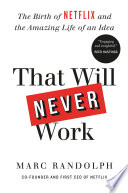

In 'That Will Never Work', Marc Randolph emphasizes resilience as a critical trait for entrepreneurs. He recounts his journey with Netflix, highlighting the numerous challenges the company faced, from technical hurdles to market skepticism. Randolph illustrates that resilience is not just about enduring tough times but also about adapting and learning from failures. He shares personal anecdotes that demonstrate how setbacks can serve as valuable lessons, encouraging readers to embrace challenges as opportunities for growth. This idea underscores the notion that success is rarely a straight path; rather, it involves navigating through a series of obstacles and learning to pivot when necessary.
Continue readingRandolph stresses the significance of building a strong team and fostering a collaborative environment. He believes that great ideas often come from collective brainstorming rather than individual efforts. Throughout the book, he details how the Netflix team worked together to innovate and solve problems, creating a culture where everyone's input was valued. This collaborative spirit not only led to better solutions but also helped to establish a sense of ownership among team members. Randolph's insights highlight that effective teamwork can amplify creativity and drive a startup's success, making it essential for aspiring entrepreneurs to prioritize collaboration.
Continue readingOne of the central themes of the book is the idea that failure should not be feared but embraced. Randolph shares stories of early missteps at Netflix and how these experiences informed future decisions. He argues that each failure provides critical insights that can lead to improved strategies and innovations. By reframing failure as a necessary step in the journey toward success, Randolph encourages entrepreneurs to take risks and experiment without the paralyzing fear of making mistakes. This perspective can empower readers to approach their ventures with a more open and experimental mindset.
Continue readingRandolph highlights the importance of understanding customer needs and preferences in driving innovation. He describes how Netflix continuously adapted its offerings based on user feedback and market trends. This customer-centric approach allowed the company to stay ahead of competitors and maintain relevance in a rapidly changing industry. Randolph's emphasis on listening to customers serves as a powerful reminder for entrepreneurs that success is not just about having a great idea but also about ensuring that the idea meets the actual needs of the market. This principle is vital for anyone looking to create products or services that resonate with consumers.
Continue readingHaving a clear vision is fundamental to guiding a startup towards success, according to Randolph. He discusses how a well-defined vision helped steer Netflix through uncertain times and keep the team focused on long-term goals. This vision acts as a compass, providing direction and motivation even when immediate outcomes are not favorable. Randolph's insights encourage entrepreneurs to articulate their vision clearly and communicate it effectively to their teams. A strong vision not only inspires but also aligns efforts towards a common purpose, making it a cornerstone of successful entrepreneurship.
Continue readingRandolph emphasizes that adaptability is crucial in the ever-evolving landscape of technology and business. He shares examples of how Netflix pivoted from DVD rentals to streaming services, a move that was not just innovative but also necessary for survival. This adaptability allowed Netflix to capitalize on emerging trends and consumer behaviors, positioning it as a leader in the entertainment industry. Randolph's message is clear: entrepreneurs must be willing to reassess their strategies and make bold changes in response to market dynamics. This flexibility can be the difference between thriving and merely surviving in competitive markets.
Continue readingTiming plays a critical role in the success of any entrepreneurial venture, as discussed by Randolph. He reflects on how launching Netflix at the right moment allowed the company to capture a significant market share before competitors could react. This concept of timing extends beyond the initial launch; it involves recognizing when to pivot, scale, or innovate. Randolph's insights serve as a reminder for entrepreneurs to stay attuned to market signals and trends, as the right timing can enhance the chances of success and create a lasting impact.
Continue readingThe reading time for That Will Never Work depends on the reader's pace. However, this concise book summary covers the 7 key ideas from That Will Never Work, allowing you to quickly understand the main concepts, insights, and practical applications in around 19 min.
That Will Never Work is definitely worth reading. The book covers essential topics including The Importance of Resilience, The Power of Team Collaboration, Embracing Failure as a Learning Tool, providing practical insights and actionable advice. Whether you read the full book or our concise summary, That Will Never Work delivers valuable knowledge that can help you improve your understanding and apply these concepts in your personal or professional life.
That Will Never Work was written by Marc Randolph.
If you enjoyed That Will Never Work by Marc Randolph and want to explore similar topics or deepen your understanding, we highly recommend these related book summaries:
These books cover related themes, complementary concepts, and will help you build upon the knowledge gained from That Will Never Work. Each of these summaries provides concise insights that can further enhance your understanding and practical application of the ideas presented in That Will Never Work.